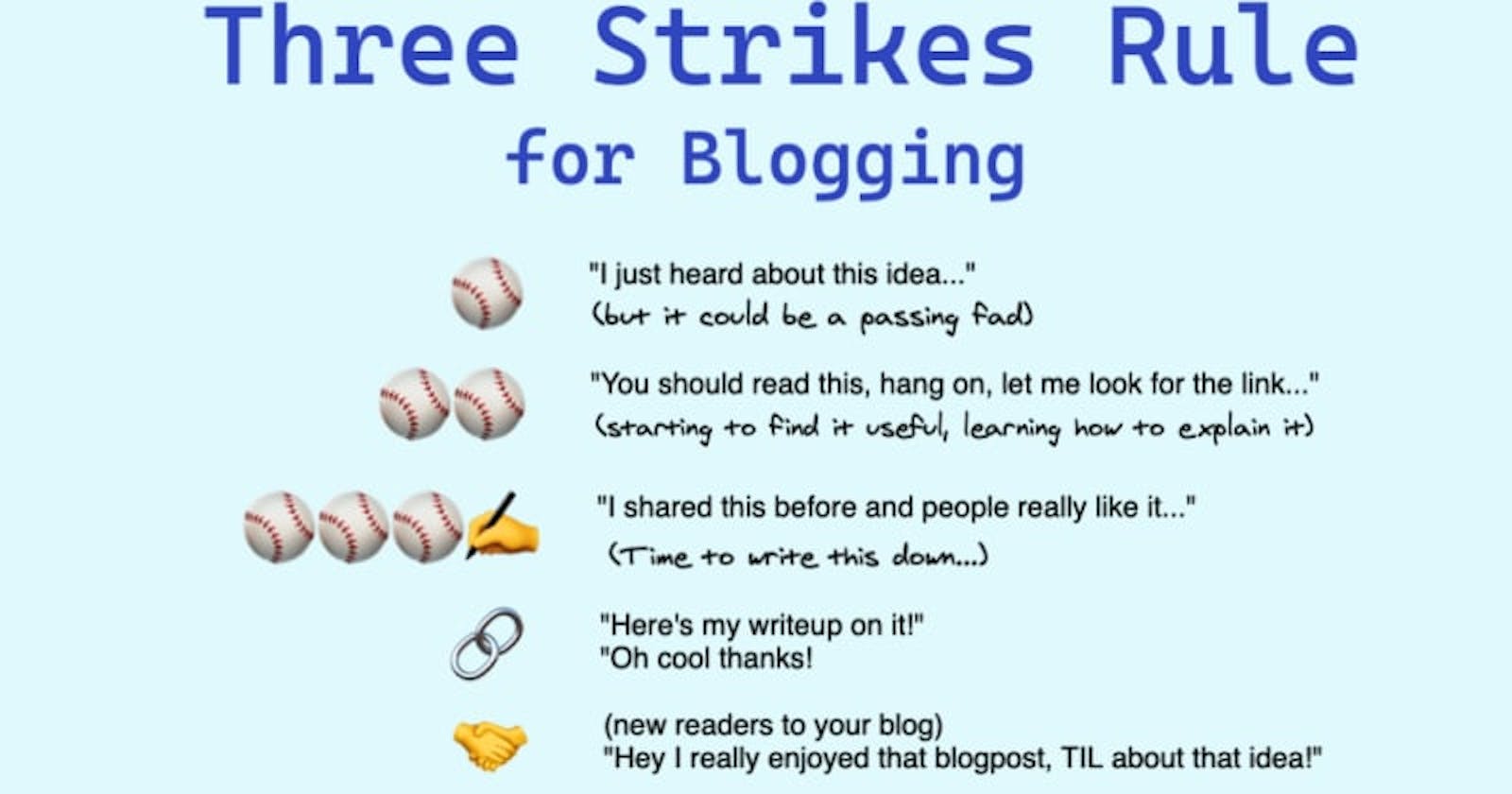title: My Three Strikes Rule for Blogging published: true description: A simple way to decide when and what to write. tags: Writing slug: three-strikes canonical_url: swyx.io/three-strikes
cover_image: cdn.hashnode.com/res/hashnode/image/upload/..
Here's how to stop being so darn precious about your blogging: The third time you use an idea in a conversation, you have to blog about it.

Why
People often wonder what to blog about. You can get really fancy with Google keyword research and content calendars and the like. It's too complicated for me, and often leads to the kind of impersonal, SEO-driven blogposts that are slowly ruining the web.
We need a simple, authentic heuristic to decide. Let's think about the upper and lower bounds:
- It's possible to blog too much — nobody wants you to broadcast every waking thought.
- But it's more likely that we are just not blogging enough.
What's obvious to you is often not obvious to others. How often do you speak with someone and casually mention something that is new to them?
Pretty often.

It's natural to want to hold off publishing our insights and discoveries until the magical right time when it all clicks together in one beautiful, perfect essay that springs forth fully formed from our foreheads, making us famous and showing the world how smart we are.
We want it so much we end up never writing it.
This is how the world misses out on so much of our unique voices, taste, and perspectives.
The Three Strikes Rule is designed as both a filter (for passing thoughts) and a prompt (for you to write more).
To stop being so precious about your blog.
To share ideas more openly and freely with your readers.
To Create Luck.
To create one reference for that bunch of links you always end up searching for when you write or answer questions.
And, quite honestly, to write shorter blogposts. Nobody has time to read the 3,000 word preamble to your magnum opus. It's a blog, not a physical book — you can return over time to expand it if it's worth it (like this or this).
Sidenote: Some people call these "blogs that grow over time" a digital garden. The mental masturbation crowd prefer Zettelkasten because it sounds foreign. It doesn't matter what you call it, it matters that you do it and grow it.
How
Let's say we accept that "the 3rd time we reference an idea in a conversation, we have to blog about it". What does that really mean?
I take an expansive view of what "ideas" and "conversations" means.
- Ideas includes great talks, good books, useful concepts, obscure names, handy definitions, copied-and-pasted code snippets, historical facts, surprising charts, and even blogposts by other people. (Yes, you can blog about other blogs. Like this. Why not?) Sometimes the idea will be your own, most times it will be your takes on others'.
- Conversations include in-person, on Zoom, on Twitter, wherever you communicate and exchange ideas.
The first time you refer to an idea, you probably just learned about it. It might be a fad; you may never find the idea useful again. Let it go.
The second time you refer to the idea, you should be taking note. Ideas are things we find useful in our day-to-day conversations, and there's probably a good amount of our readers who would too. But it might still fade away, so we hold off on it. It still needs to prove its usefulness.
By the third time you refer to an idea, it's no longer a coincidence. It's a pattern. You're increasingly likely to refer to it again in future. It's marinated in your head for a bit, and you've likely gained some experience explaining it to others. It's also not so old that it may have lost relevance. It's time to write it down to save keystrokes.
Do I literally write everything down after the 3rd time? No, sometimes the "three strikes" becomes the "five strikes" or the "ten strikes" rule, mostly out of laziness. But I know I should. With this rule, I find that I blog more and people still get value out of the core idea.
In case you were wondering... yes the "reference counter" on the Three Strikes rule itself got up to about 8 or 9 before I wrote this post. 🙈
Delivery
Following this rule will dramatically increase the volume of your output. There's then the question of how to deliver these high frequency things. There are a few methods:
- Tweet it out
- Dump them in a github repo (like this)
- Split your blog from "only having essays" mode to having both "essays" and "notes". Publish separate RSS feeds for them.
- Buffer them up for a "grab bag post" like Tyler Cowen
Personally, I am exploring doing this with a daily podcast. See what works for you.
If you're worried that people will think you're too noisy, you probably shouldn't.
"You’ll worry less about what people think about you when you realize how seldom they do." - David Foster Wallace, Infinite Jest
I'd love for you to share great ideas more freely. Great ideas deserve to be shared, and your readers will appreciate it.
